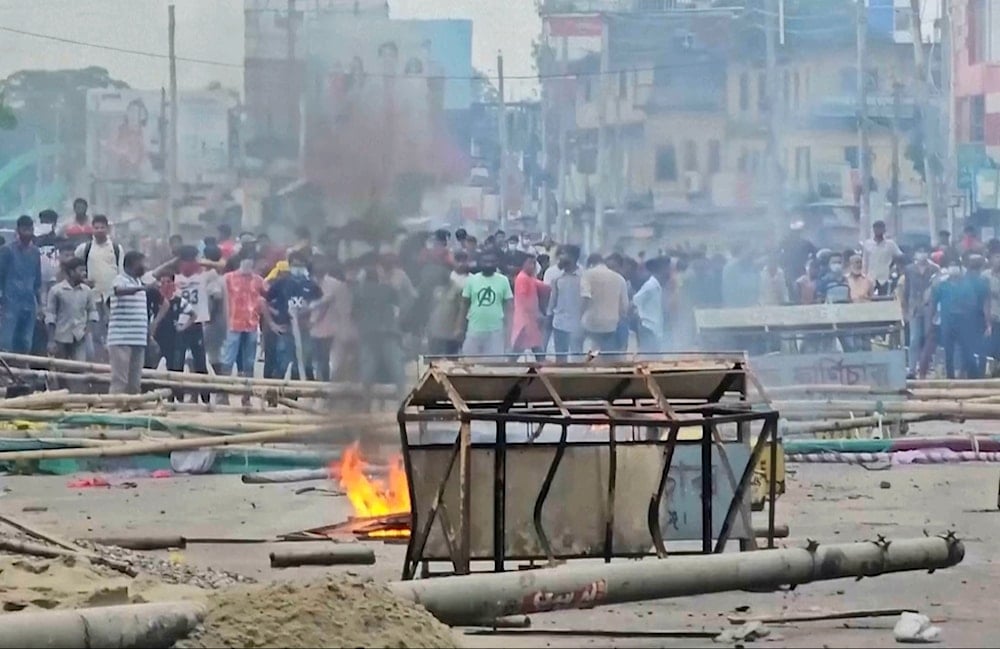Bangladesh to unveil major reforms on Hasina ouster anniversary
Bangladesh's interim government, led by Muhammad Yunus, will unveil a sweeping democratic reform plan on August 5, aiming to rebuild institutions after a student-led uprising.
-

In this image made from a video, supporters of the ousted Prime Minister Sheikh Hasina clash with the police in Gopalganj, Bangladesh, Wednesday, July 16, 2025. (AP Photo)
Bangladesh's interim leadership announced Saturday that the country will unveil a comprehensive set of democratic reforms on August 5, marking one year since former Prime Minister Sheikh Hasina was ousted from power during a mass student-led uprising.
The South Asian nation, home to approximately 170 million people, has been navigating a turbulent political transition since the August 5, 2024, revolt that ended Hasina's 15-year rule. That uprising, sparked initially by protests over the public sector job quota system, quickly escalated into a nationwide movement against authoritarian rule.
Over 1,400 people were reportedly killed during the protests, in what is now referred to as the Monsoon Revolution or July Massacre.
The transitional government, headed by Nobel Peace Prize laureate Muhammad Yunus, was installed in the wake of the upheaval to steer the country toward democratic recovery. Yunus, now 85, assumed the role of Chief Advisor with a mandate to restore political order and prepare the ground for national elections, tentatively scheduled for early 2026.
Yunus has described the condition of the state apparatus he inherited as catastrophic. "I inherited a completely broken down system of public administration," he said, reflecting the deep institutional rot that plagued the country under Hasina. Her regime had been widely criticized for systemic human rights abuses, including the mass detention and extrajudicial killing of political opponents, manipulation of the judiciary, and the suppression of free media.
Reform Crossroads
The upcoming reform package, dubbed the July Proclamation, is expected to address many of these structural issues. Yunus has pledged a sweeping overhaul of democratic institutions to ensure inclusive and transparent governance. On July 29, he reiterated his commitment to "build a broad national consensus around a renewed political system -- one that delivers inclusive, participatory, and credible elections."
His office confirmed that the proclamation will be made public next week "in the presence of all political parties involved in the mass uprising." The document reportedly contains 26 key reform points and is intended to serve as the foundation for a new constitutional and political order. However, disagreements over the scope of reforms, the timeline for elections, and the role of the military have slowed progress. Yunus has faced growing frustration, even considering resignation at one point amid challenges to consensus-building.
The political climate remains fragile. Hasina, now in exile in India, has refused to return to Bangladesh, ignoring court orders related to ongoing trials for alleged crimes against humanity. Meanwhile, her political party, the Awami League, has been officially banned from political activity, further complicating the transitional process.
Read more: Bangladesh opens trial against ex-PM Hasina
Democratic Reckoning
Despite these tensions, the Yunus-led administration has received support from a broad spectrum of civil society, opposition parties, and international observers. New political movements such as the student-backed National Citizen Party have emerged, reflecting the public demand for systemic change.
As the anniversary of Hasina's ouster approaches, attention turns to the caretaker government's ability to translate revolutionary momentum into lasting institutional reform. The success of the July Proclamation may ultimately determine whether Bangladesh embarks on a path of democratic consolidation or risks falling back into repression and disorder.

 3 Min Read
3 Min Read










